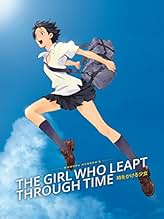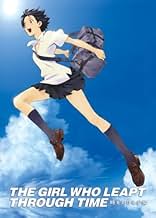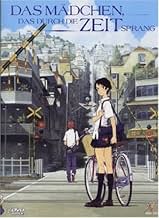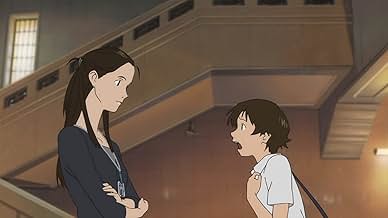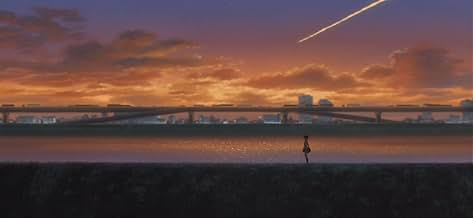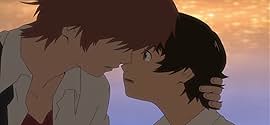अपनी भाषा में प्लॉट जोड़ेंA high-school girl named Makoto acquires the power to travel back in time, and decides to use it for her own personal benefits. Little does she know that she is affecting the lives of others... सभी पढ़ेंA high-school girl named Makoto acquires the power to travel back in time, and decides to use it for her own personal benefits. Little does she know that she is affecting the lives of others just as much as she is her own.A high-school girl named Makoto acquires the power to travel back in time, and decides to use it for her own personal benefits. Little does she know that she is affecting the lives of others just as much as she is her own.
- निर्देशक
- लेखक
- स्टार
- पुरस्कार
- 12 जीत और कुल 2 नामांकन
- Makoto Konno
- (वॉइस)
- Miyuki Konno
- (वॉइस)
- Obasan
- (वॉइस)
- Kato
- (वॉइस)
- School Nurse
- (वॉइस)
- …
फ़ीचर्ड समीक्षाएं
"The Girl Who Leapt Through Time" is based on a 1967 hit novel of the same title. The original work has been used in numerous film and dorama adaptations, most famous ones being the 1983 film directed by Oobayashi Nobuhiko. Instead of making just another anime adaptation and possibly becoming just another adaptation shadowed by the 1983 film, the producers took a risk by creating a spin-off movie with the setting of about 20 years after the original story. The gamble paid off big time, as the animated film went on to win at least 23 awards worldwide.
The underlying theme in this movie was "the importance of living the moment". Our protagonist was given the power to leap back into time to correct her mistakes, only to realize later that the short-term gains only lead to greater losses that followed. The story was extremely well-constructed to teach the lesson of embracing things the way they are, and never run from confrontations, because once that moment gone, you'll never get it back.
The director for this film did a phenomenal job of pacing and creating many memorable moments, but it was the live-action film screenwriter Okudera Satoko, who really made a difference for this movie by composing a story out of number of time leaps that slowly developed the main characters and made so many epic scenes possible. Many anime screenwriters fail in movies because they incorporate too many characters, as it is common practice in series, into the limited 100 minute time-frame. What's remarkable about this piece of work is that it focuses on only three main characters. Even counting the secondary cast, there are only 8 characters in total who we are given the names of. The limited number of characters not only improved character development, it also allowed the story to focus on the underlying theme.
I was actually very uncertain about the viewing this year because I started watching a lot of TV anime again since the last viewing. However, the only new flaws I've noticed was the excessive still motion in some scenes and most backgrounds, and that the protagonist was being a bit overly insensitive in few instances, which made her character a bit unrealistic. Animation is years ahead of its time, and it still is an excellent example of what happens when music is in harmony with the story/animation. The insert song by Oku Hanako, IMO, is still the best selection ever made among hundreds of Japanese films, anime, and live-action doramas I've encountered. Ending theme is a truly poignant one that really captured the mood and made the story sink in, and the music score throughout the movie has been used perfectly to enhance the drama.
"The Girl Who Leapt Through Time" is a timeless masterpiece that made me want to cherish every moment, and it's a movie I expect myself to be re-watching for many more years to come.
The Girl Who Leapt Through Time tells a wonderful story centered on 3 friends, the tomboyish and clumsy Makoto Konono (voiced by Riisa Naka), and two hunks Chiaki Mamiya (Takuya Ishida) and Kousuke Tsuda (Mitsutaka Itakura). Theirs is a friendship formed after school at the baseball court where they spend quality time talking about typical teenage stuff. Things start to change however, when Makoto by accident gets the power to time travel, and in her own ditzy way, uses her new found abilities for "good" - directly for herself, or in some Emma like moments, to influence the outcome of relationships for her friends and play matchmaker.
And that's just scratching the tip of the iceberg. While it's animation style is kept simple and fairly straightforward, it doesn't compromise on the complexity of its storyline. Not that it serves to confuse, rather you'll be amazed by the amount of pathos the story contains, with its various subplots especially when the time travelling stuff kicks in. It has adult sensibilities in the treatment of the plot, and knows exactly when to hit the right emotional chords when warranted.
Although based on a book, the story here serves as a quasi-sequel of sorts which takes place some 20 years later, what I can say is that the love stories intertwined has its major one being able to touch like that in Be With You. I loved that movie, and watching how this bore some similarities, you can't help but feel the same emotions coming across in the same way, nevermind that the characters here are animated, as you can feel the pain, the love, and their despair. And that is something that I should say is difficult for the genre - they're not real persons on screen - but yet being able to evoke emotions and for one to react and empathize, definitely makes it powerful, and a cut above others. Something that our local animated films had failed to do in giving us cold characters and bastardized stories from folklore.
But it's not always all the time serious in tone or mood. The movie has light hearted moments, sometimes bordering on the slapstick, no thanks to the bumbling Makoto character. In a sequence, it was reminiscent of Chinese Odyssey starring Stephen Chow, where each time travel moment gets played ad nausem with different comedic effect. Undoing blunders as we see is not exactly Makoto's forte, and while she may be using her powers in a carefree way, with great powers come great responsibilities (sorry, can't resist that one!)
As usual, anyone can find fault with the time travel paradox which rears its ugly head in any time travel movie, but I would suggest that you park those thoughts aside, and enjoy the story that the Girl Who Leapt Through Time is telling. There are slight attempts at addressing it with its creation of totally new and different realities with each jump, but even then a major paradoxical flaw still exists. At its lowest denominator, the film reminds to seize the day like it's your last, do what's right, and don't be shy in telling someone how you feel about them.
The Best Animated Film of the recent Awards of the Japanese Academy, this film gets my vote of support too with its superbly emotional and touching tale, and with its similarities to that aspect of the film which I like to Be With You, it will be no surprise if this movie finds its way to my Top Ten of the year. Highly recommended!
There are a few oddities in this movie. Some of them are because it turns out, as I learned at wikipedia, that this isn't actually the same story as the novel upon which it is based but a sequel containing a character from the original movie, which explains a lot. Apparently the original story has been made into several movies and TV series in Japan, so the assumption was probably that everyone would understand a lot of references I didn't get.
Also, towards the end, we are given little pieces of information that suggest there is a whole other story to learn, although whether that story is in the original book or whether that would be the subject of yet another narrative I don't know.
Then there's the ending, which is logically unsatisfying and yet which I ultimately found emotionally resonant. It's one of these puzzling endings that has you reading wikipedia and going through the IMDb forum posts (which offer a lot of fascinating theories).
Well worth watching.
P.S. Now I have to buy the DVD.
As a teen slice of life/tentative romance/drama the story seems like it could be cliché, but they do interesting things with it, make it more dramatic in the middle, and at the end i was satisfied. the emotional depth sort of sneaks up on you.
Sounds were well-integrated into the film and the voice actors were spot-on in their portrayals.
just a fine experience watching this on here in Asia.
Highly recommended for all, but a must for anyone who's into anime.
wow I'm gonna look out for anything by this studio and director in the future.
क्या आपको पता है
- ट्रिवियाThis movie is an indirect adaptation of Yasutaka Tsutsui's novel "The Girl Who Leapt Through Time" - the main character's aunt is Yoshiyama Kazuko, the protagonist of the novel.
- गूफ़Spoiler: During the time-stop sequence Chiaki laments that he will not be able to see the painting he has come to the past for because it is in restoration and he will not be around the next day when it is put on the wall. But Makoto knows that the picture is worked on by her aunt and so they could just go upstairs and take a look at it (they may find the door locked but the possibility is not even mentioned). Chiaki's last jump could not have erased that memory because Makoto's knowledge predates the event.
- भाव
Yuri Hayakawa: [Makoto Leaves the room, then Yuri watches the Blackboard] Makoto: Time waits for no one
- कनेक्शनFeatured in Glass Reflection: The Girl Who Leapt Through Time (2010)
टॉप पसंद
विवरण
बॉक्स ऑफ़िस
- दुनिया भर में सकल
- $15,36,971
- चलने की अवधि
- 1 घं 38 मि(98 min)
- रंग
- ध्वनि मिश्रण
- पक्ष अनुपात
- 1.78 : 1


